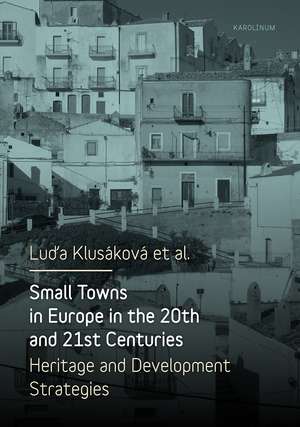Small Towns in Europe in the 20th and 21st Centuries: Heritage and Development Strategies
Autor Lud'a Klusákováen Limba Engleză Paperback – 12 mar 2018
Always in the shadow of their more famous urban neighbors, small towns are consistently overlooked in historical research, especially in Europe. This book investigates the ramifications of that tendency for development initiatives. Paying particular attention to the marketability of towns’ cultural heritage and of the diverse ways local culture has been influenced by national and regional history, an international team of urban historians, sociologists, and historians of art and architecture present case studies of towns in England, Spain, Portugal, Greece, the Czech Republic, and Russia to explore new methods for motivating development and renewal.
Preț: 95.45 lei
Preț vechi: 115.77 lei
-18% Nou
Puncte Express: 143
Preț estimativ în valută:
18.26€ • 19.07$ • 15.12£
18.26€ • 19.07$ • 15.12£
Carte indisponibilă temporar
Doresc să fiu notificat când acest titlu va fi disponibil:
Se trimite...
Preluare comenzi: 021 569.72.76
Specificații
ISBN-13: 9788024636450
ISBN-10: 802463645X
Pagini: 160
Dimensiuni: 152 x 203 x 13 mm
Greutate: 0.26 kg
Editura: Karolinum Press, Charles University
Colecția Karolinum Press, Charles University
ISBN-10: 802463645X
Pagini: 160
Dimensiuni: 152 x 203 x 13 mm
Greutate: 0.26 kg
Editura: Karolinum Press, Charles University
Colecția Karolinum Press, Charles University
Notă biografică
Luďa Klusáková is professor of general and comparative history at Charles University in Prague, where she specializes in European towns, the modernization process, and urban history.
Cuprins
Preface
Ludʾa Klusáková
Small Towns as a European Cultural Heritage, Introduction
Ludʾa Klusáková and Marie-Vic Ozouf-Marignier
Performing the Past: Identity, Civic Culture and Historical Pageants in Twentieth-Century English Small Towns
Angela Bartie, Linda Fleming, Mark Freeman, Tom Hulme and Paul Readman
“The architectural rhythm of a small town … is very familiar to us.”
A Small Town as an Aesthetic Ideal of the Twentieth Century
Martin Horáček
Strategies of Manufacturing the Tourist Experience in a Small Town: Local community and Symbolic COsntruction in Myshkin
Greg Yudin and Yulia Koloshenko
Urban Cores and Urban Identity: Appropriating and Rejecting a City’s History, The Case of Rethymno
Olga Moatsou
Miraculous Equilibrium. Keys for a Sustainable Network of Small South Iberian Cities
Blanca Del Espino Hidalgo
Concluding remarks
Ludʾa Klusáková and Marie-Vic Ozouf-Marignier
Bibliography
Note on Authors
Ludʾa Klusáková
Small Towns as a European Cultural Heritage, Introduction
Ludʾa Klusáková and Marie-Vic Ozouf-Marignier
Performing the Past: Identity, Civic Culture and Historical Pageants in Twentieth-Century English Small Towns
Angela Bartie, Linda Fleming, Mark Freeman, Tom Hulme and Paul Readman
“The architectural rhythm of a small town … is very familiar to us.”
A Small Town as an Aesthetic Ideal of the Twentieth Century
Martin Horáček
Strategies of Manufacturing the Tourist Experience in a Small Town: Local community and Symbolic COsntruction in Myshkin
Greg Yudin and Yulia Koloshenko
Urban Cores and Urban Identity: Appropriating and Rejecting a City’s History, The Case of Rethymno
Olga Moatsou
Miraculous Equilibrium. Keys for a Sustainable Network of Small South Iberian Cities
Blanca Del Espino Hidalgo
Concluding remarks
Ludʾa Klusáková and Marie-Vic Ozouf-Marignier
Bibliography
Note on Authors
Recenzii
“This edited volume . . . may help in filling the large gap . . . in the historical knowledge of urban Europe. There has been just one more project on European small towns carried out in the 1990s by Peter Clark and Bernard Lepetit, which dealt with the early modern period. Since then there have not been . . . other explorations that address small towns in Europe in any historical period. Hence my firm conviction that the . . . volume will definitely enforce . . . all-European knowledge about small towns and their role in preservation of the cultural heritage.”
“From a greater distance it may become more explicit that individual cases testify to a certain marginalization of small towns in the modern period and, on the contrary, to their growing role in the period of globalization, when their wider networking through tourism, the media, and perhaps thanks to a certain saturation of interest in the metropolis, overcomes their historically given provincialism. This book is rich in content, inspiring, and certainly will be interesting for the professional public dealing with issues of history, anthropology, sociology, arts management, tourism, architecture, and urbanism.”
